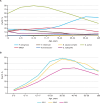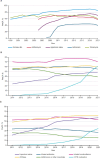Considerations for the use of inhaled antibiotics for Pseudomonas aeruginosa in people with cystic fibrosis receiving CFTR modulator therapy
- PMID: 38702073
- PMCID: PMC11086488
- DOI: 10.1136/bmjresp-2023-002049
Considerations for the use of inhaled antibiotics for Pseudomonas aeruginosa in people with cystic fibrosis receiving CFTR modulator therapy
Abstract
The major cause of mortality in people with cystic fibrosis (pwCF) is progressive lung disease characterised by acute and chronic infections, the accumulation of mucus, airway inflammation, structural damage and pulmonary exacerbations. The prevalence of Pseudomonas aeruginosa rises rapidly in the teenage years, and this organism is the most common cause of chronic lung infection in adults with cystic fibrosis (CF). It is associated with an accelerated decline in lung function and premature death. New P. aeruginosa infections are treated with antibiotics to eradicate the organism, while chronic infections require long-term inhaled antibiotic therapy. The prevalence of P. aeruginosa infections has decreased in CF registries since the introduction of CF transmembrane conductance regulator modulators (CFTRm), but clinical observations suggest that chronic P. aeruginosa infections usually persist in patients receiving CFTRm. This indicates that pwCF may still need inhaled antibiotics in the CFTRm era to maintain long-term control of P. aeruginosa infections. Here, we provide an overview of the changing perceptions of P. aeruginosa infection management, including considerations on detection and treatment, the therapy burden associated with inhaled antibiotics and the potential effects of CFTRm on the lung microbiome. We conclude that updated guidance is required on the diagnosis and management of P. aeruginosa infection. In particular, we highlight a need for prospective studies to evaluate the consequences of stopping inhaled antibiotic therapy in pwCF who have chronic P. aeruginosa infection and are receiving CFTRm. This will help inform new guidelines on the use of antibiotics alongside CFTRm.
Keywords: Bacterial Infection; Bronchiectasis; Cystic Fibrosis; Respiratory Infection.
© Author(s) (or their employer(s)) 2024. Re-use permitted under CC BY-NC. No commercial re-use. See rights and permissions. Published by BMJ.
Conflict of interest statement
Competing interests: P-RB has received advisory board fees from Viatris; research grants (paid to the institution) from GSK and Vertex Pharmaceuticals; consulting fees from AstraZeneca, Chiesi, GSK, Insmed, MSD, Vertex Pharmaceuticals, Viatris and Zambon and support for attending meetings from AstraZeneca and Chiesi. MB has received consultancy fees from Vertex Pharmaceuticals and Viatris; honoraria for presentations from ALK and Vertex Pharmaceuticals and advisory board honoraria from Viatris. PD has received honoraria for lectures from Chiesi and Vertex Pharmaceuticals; participated in advisory boards for Vertex Pharmaceuticals and Viatris and is President of the Czech Society for Medical Microbiology. HH has received consultancy fees from Vertex Pharmaceuticals and Viatris; honoraria for educational activities and advisory boards from Vertex Pharmaceuticals; honoraria for educational activities from AstraZeneca and advisory board honoraria from Viatris. AJ has received consultancy fees from EffRx Pharmaceuticals and Vertex Pharmaceuticals; honoraria for presentations from OM Pharma and Vertex Pharmaceuticals and participated in advisory boards for OM Pharma, Sanofi Aventis and Viatris. JGM has received consultancy fees from Chiesi, Pari, Vertex Pharmaceuticals and Viatris; honoraria for presentations from Chiesi and Vertex Pharmaceuticals; support for attending meetings from Chiesi and participated in advisory boards for Viatris. DP has received an educational grant from Gilead; honoraria for educational lectures; participated in past advisory boards for AbbVie, Chiesi, Gilead, Sanofi, Vertex Pharmaceuticals and Viatris and support for attending an advisory board meeting from Viatris. BP has received consultancy fees from Chiesi and Vertex Pharmaceuticals; honoraria for lectures from AstraZeneca, Chiesi, GSK, Insmed, Vertex Pharmaceuticals and Viatris; and advisory board fees from Viatris. CS has received honoraria as a speaker from AbbVie, Chiesi, Horizon Therapeutics, TFF Pharmaceuticals, Vertex Pharmaceuticals and Viatris and support for attending conferences from the European Cystic Fibrosis Society. GT has received consultancy fees from Pfizer, Shionogi, Vertex Pharmaceuticals and Viatris and honoraria from Chiesi and DMF Pharma FoodAR. AS has received research grants (paid to the institution) from Vertex Pharmaceuticals (outside of the current work) and payment for an advisory board (paid to the institution) from Viatris for participation in a workshop to discuss inhaled antibiotics in CF. He has patents issued (Camara M, Williams P, Barrett D, Halliday N, Knox A, Smyth A, Fogarty A, Barr H, Forrester D. Alkyl quinolones as biomarkers of Pseudomonas aeruginosa infection and uses thereof. US-2016131648-A1. https://pubchem.ncbi.nlm.nih.gov/patent/US-2016131648-A1 (outside of the current work)) and reports participation on a Data Safety Monitoring Board for the North American Cystic Fibrosis Foundation Therapeutics Development Network.
Figures


References
Publication types
MeSH terms
Substances
LinkOut - more resources
Full Text Sources
Medical
